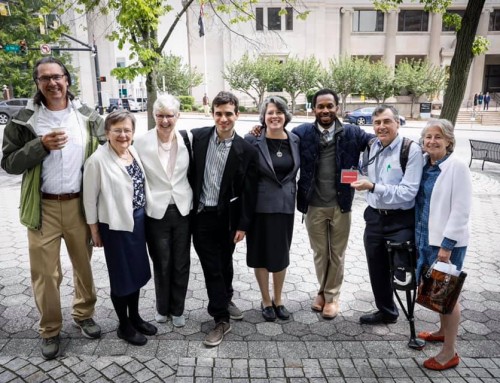 I’m teaching Discerning Our Calls at Pendle Hill this semester, so I’ve been thinking a lot about how we listen for divine guidance in our lives. I’m also working on my 2010 taxes. Perhaps it was inevitable that I would start to see connections, far fetched as they may sound. This blog may be the only place I can get away with this outrageous comparison, but here are a few similarities I’ve noticed:
I’m teaching Discerning Our Calls at Pendle Hill this semester, so I’ve been thinking a lot about how we listen for divine guidance in our lives. I’m also working on my 2010 taxes. Perhaps it was inevitable that I would start to see connections, far fetched as they may sound. This blog may be the only place I can get away with this outrageous comparison, but here are a few similarities I’ve noticed:
1. It helps if you keep track of what’s going on throughout the year. A regular practice of paying attention—whether it is to your expenses or your spiritual experiences—makes it much easier when you get to the big moment of declaration. If you don’t pay attention throughout the year, you’re likely to feel overwhelmed at crunch time.
2. Paying attention takes time and a certain amount of discipline. Whether it’s recording your dreams in a journal or recording your mileage as you go out to lead workshops, jotting things down is easily forsaken when there are emails to be answered and children to be fed. If you don’t want to be in the same state of confusion next spring, you need to make paying attention a daily (or at least a weekly) habit.
3. The more you do it, the more you realize you don’t know. This is definitely my experience of spiritual discernment, which seemed much more clear-cut when I started writing about it seventeen years ago. It makes a person wish there were unambiguous rules, like in the tax code. But even there, the sand seems to constantly shift. It turns out that I can deduct my mileage if I drive to Syracuse to give a talk, but not if I drive across town. (Phoenixville, where I spoke last Sunday, is apparently a bit of a grey area.) And did you know that you can deduct 50 cents per mile for driving to volunteer work, no matter how close it is? That means all those business meetings when I was assistant clerk, the soccer games I chaperoned for school, and the meetings my husband attended to set up a homeless shelter. Too bad I wasn’t keeping track.
It occurs to me that, like a journal, our mileage and financial contributions reveal something about our values. They are worth a serious look from time to time. Of course, if you take the bus to all your volunteer gigs, you have even better values than we do, and you can probably deduct your bus tokens, but you’d better check with your tax advisor about that.
4. It helps to consult others. Recently my writers group invited a tax guy who specializes in helping artists and other small business people who tend not to be naturally business savvy. Along with all the things I learned from him, it was good to hear the questions of other writers, some of whom had great systems for keeping track of all this stuff. Likewise, it’s best to do your discernment in community; we can learn so much from each other and feel empowered to make needed changes.
5. You can’t really pay someone to do it for you. Well, OK, you can pay someone to figure out what numbers go in what boxes on the tax form. But the real work is in adding up all the contributions, prescription co-pays, books given away to reviewers, and money spent on health insurance. It’s keeping track of where we are and what we’ve been doing that’s the hard work, and as any tax accountant will make clear, that part is your job. Likewise, a spiritual director or a clearness committee may make suggestions or ask good questions, but in the end they are no more liable for the truth of what you tell them than your accountant.
Of course, there are obvious differences between these endeavors, most notably the fact that discernment is meant to grow out of our relationship with the Divine Spirit, which has helped me with many decisions but which has never actually done my taxes for me. Maybe I should start praying for that, though I suspect this is one of those areas where we are meant to grow up and figure things out for ourselves.







Honestly, I'm wrestling with parts of this post… I keep being reminded that what might be a "discipline" for me–to track expenses, eg–might be seen as a luxury or as a "rich person's problem" for someone with much lower income.
So on the one hand, I want to be accountable and responsible to pay my share of taxes (and then some, in the form of philanthropy); on the other hand, am I really making the world a better place for those who suffer if I worry about whether I remembered to write down the car's odometer reading at the start of the year?
Granted, a few years ago, I would never have viewed your post through the lens of social class privilege. Given recent experiences and a bit of reading, though, (see the list on the left-hand sidebar on the blog Quakers and Social Class), I am beginning to get a better grip on institutionalized oppression in the U.S. based on social class…
Blessings,
Liz Opp, The Good Raised Up
Liz, Thanks for your post ~ you raise a very important point… "Middle Class" really is a very privileged class and we sometimes forget that in this country.
I am reminded of this every year when I go into remote Belize villages and set up medical clinics for patients who only receive this health care once a year.
In my humble opinion, these are 2 separate issues. One is the issue of taxes and the other is the issue of the poverty we have in our own country and the poverty worldwide. Certain things are taxed and others are not. The collection of information is so that the tax is fair and just (Though, I think it is *not* even when one is obsessive about data collection… but, that is a subject for another time)
I am a health care provider, so I have an intimate awareness of the many layers of poverty in this country. There are many ways that this issue can be addressed. That is a topic too lengthy for this blog reply. I am still perplexed why our Health Care System remains in the hands of the third-party insurance companies. Health care is a insurance business industry and not *care* for the health of patients. Ask anyone who has a chronic illness. Those in poverty suffer most. I do what I can by providing free health care and free health advice hoping a small pebble will ripple out… I stay focused on the *Hope* that I receive from the Inner Light. 🙂
PS @ Liz… I have your book and I *LOVE* it!
My attempt at responding with links didn't work, so here's a response in a new post.